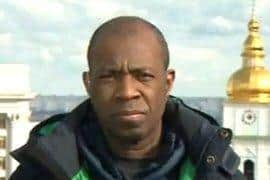Russia sanctions dozens of UK journalists and media figures, including BBC and Guardian staff
A statement published by its Ministry of Foreign Affairs said those included on the 29-strong list were “involved in the deliberate dissemination of false and one-sided information” about Russia and the war in Ukraine.
Another 20 figures who Moscow claim are linked to the defence industry were also sanctioned.
Advertisement
Hide AdAdvertisement
Hide AdAmong those on the list are BBC director-general Tim Davie, The Times’ editor John Witherow, The Guardian’s editor-in-chief Katharine Viner, editor-in-chief of the Daily Telegraph Chris Evans, and BBC chairman Richard Sharp.


BBC journalists Nick Robinson, Orla Guerin and Clive Myrie, who have all reported from the ground in Ukraine and its capital of Kyiv during the conflict, also feature, as do correspondents from ITV News and Channel 4 News.
Russia said the journalists and media representatives named had contributed towards “fuelling Russophobia in British society”.
A spokesperson for the BBC said: “We will continue to report independently and fairly.”
Russia said those figures on the list who are connected to the UK defence industry had been involved in making decisions “on the supply of weapons to Ukraine, which are used by local punishers and Nazi formations to kill civilians and destroy civilian infrastructure”.
They included Britain’s navy chief and senior executives at defence and aerospace firms Thales UK and BAE Systems.
Moscow has seized on the far-right origins of one of the units in Ukraine, calling the Azov Regiment’s fighters “Nazis” and accusing, without evidence, their commander of committing atrocities during the war.
Last month foreign secretary Liz Truss announced Russian businesses were being cut off from the UK’s accountancy, management consultancy and PR sectors, as part of further sanctions against the country.
Advertisement
Hide AdAdvertisement
Hide AdThe ban on journalists comes with the city of Sievierodonetsk in eastern Ukraine having not yet been blocked off by Russian troops.
However, a Ukraine official said Russia control about 80 per cent of the area and have destroyed all three bridges leading out of the city.
“There is still an opportunity for the evacuation of the wounded, communication with the Ukrainian military and local residents,” Luhansk regional governor Serhiy Haidai said.
He acknowledged that Ukrainian forces had been pushed out to the industrial outskirts of the city because of “the scorched earth method and heavy artillery the Russians are using”.
About 12,000 people remain in Sievierodonetsk, a city with a pre-war population of 100,000. More than 500 civilians are sheltering in the Azot chemical plant, which is being relentlessly pounded by the Russians, according to Mr Haidai.
A total of 70 civilians have been evacuated from the Luhansk region over the past 24 fours, the governor said.
Two people were killed and another wounded in the Luhansk region, according to Ukrainian authorities.
Comments
Want to join the conversation? Please or to comment on this article.